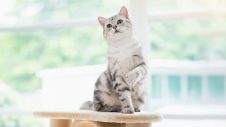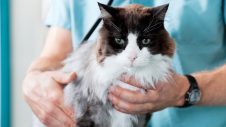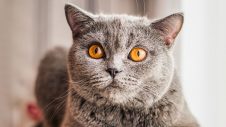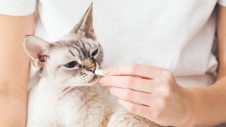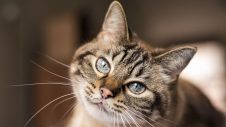Unlike dogs, cats do not pant rapidly to cool down. So if your cat is panting, it’s not normal. Panting in cats is almost always a cause for concern.
What does it mean if my cat is panting like a dog?
A cat’s normal breathing rhythm should be smooth and unlaboured. Panting is usually a sign that something isn’t right with your cat. Cats only breathe hard with their mouths open when they are very stressed, extremely hot, or a disease process is occurring.
Some degree of ‘normal’ panting can be seen in cats, but context is important if you suddenly notice panting. If for example prior to panting your cat was doing some strenuous exercise, may be overheated or could be anxious, if possible to do so without stressing your cat, check your cat’s gum colour, if it is a normal pink to pale pink colour then you can monitor for a brief period of time. If related to a stressful episode that has passed or exercise, the panting should settle quickly within 5 – 15 minutes generally. If your cats gum colour seems to be a very pale pink (more than normal), white, grey, blue or purple hued or their breathing itself is very laboured (eg appear to have trouble getting air into their lungs) this is a serious cause for concern and could indicate they are not getting enough oxygen and need to be seen by a vet ASAP.
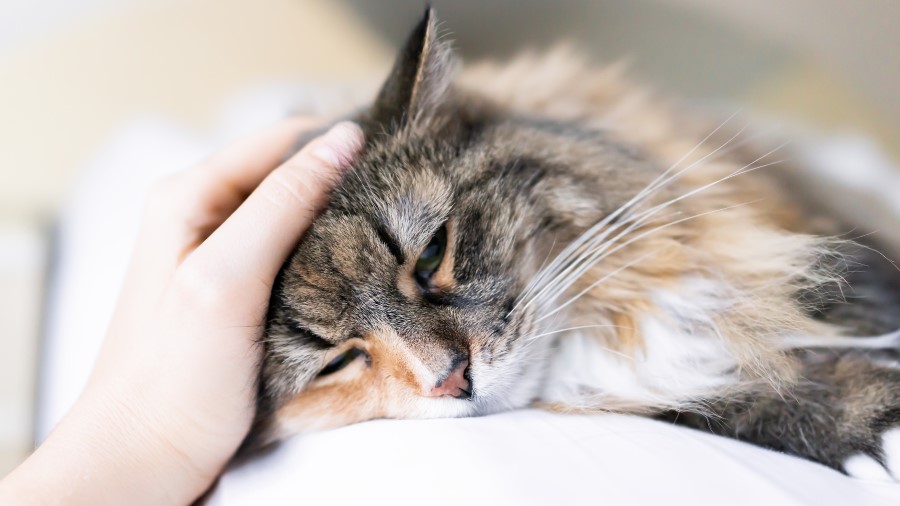
There are many conditions that could bring on a bout of sudden laborious panting and cats are notorious for hiding illness till they are very unwell, so this behaviour should never be ignored. Older cats are more at risk for medical conditions and less inclined to exercise as kittens so if seen in seniors it should be noted as even more likley to be a concern.
Panting is most definitely NOT confined to just old cats, with younger cats susceptible to medical issues and infectious diseases that can affect breathing also. Some examples of serious medical conditions that can cause respiratory distress and panting in cats include; heart disease, asthma/bronchitis, pneumonia, pleural effusion, cancer, infectious disease, issues with red blood cells including damage and blood loss. All these conditions are serious, need medical intervention by a veterinarian and can become life threatening in a short space of time.
Regardless of the cause, if your cat is panting, it’s important you visit your local Greencross Vets immediately. Please call your local vet when you are on the way, as some cases may need to be diverted to an emergency vet hospital, depending on the severity of the case, to give them the best chance. Your vet can conduct a range of tests to confirm or rule out specific conditions depending on how your cat appears when they examine it, to determine what may be causing the panting.
Some examples of tests your vet may recommend to identify the cause of your cat’s panting include; blood evaluation to check for organ issues and red blood cell changes, and imaging (x-rays and/or ultrasound) to assess the heart and lungs.
Take as much notice of your cat’s symptoms as you can and give all this information to your vet, as it can often help them piece together a better understanding of why your cat may be panting. It is very helpful for the vet to know information such as when the issue started (even if more minor previously), how often it has happened prior being seen and any other clinical signs seen at home.
How to Calm a Panting Cat
As mentioned above, cats often hide their illness till they are very sick and if they are panting due to an advanced medical issue, even a small increase in stress can be enough to push them over into a state where they can not cope and oxygenate effectively, so keeping them as calm as possible and allowing them room to position themselves in whichever way is easiest for them to breath is very important. There isn’t a whole lot you can do at home for a panting cat, so it’s best to get a professional opinion on what is causing their distress. Dr Walsh recommends the following quick tips while preparing to go to the vet.
- Keep both the cat and yourself calm. Your cat becoming anxious could cause the panting to worsen.
- If you think your cat has overheated, moisten the feet and ears with a cool, wet towel. Overheating can also cause panting, so keeping your cat comfortable is important.
- Do not give your cat any food or water by mouth.
Always consult your local Greencross Vets if you are worried about symptoms in your pet.
Cat Panting FAQs
Why is my cat panting while playing?
Like dogs, cats may sometimes start panting when they exert themselves, or get overexcited. Although more common in kittens, it also happens with adult cats too. If your cat is panting while playing, it may simply be due to them overexerting themselves from running around and playing with either a toy or other animals. If you can, when you notice the panting encourage your cat to stop and take a rest, or if they are playing with another animal see if you can gently separate the two to encourage some calm. Monitor your cat to ensure their panting subsides once they have calmed down.
Why is my cat panting in the car?
Unlike humans, cats do not sweat so when their body temperature rises or heart beats faster, they will pant to help themselves cool down. If you notice your cat is panting in the car, it is likely because they are stressed and anxious due to the travel. They may be unsure of the situation, which leads their heartbeat to increase and results in their panting. Cats enjoy having their own territory, so being put into a new environment, often in a carrier does not tend to be well received by them. Attempt to keep your cat calm by letting them see the carrier before they travel – try leaving it out for them to investigate a few days prior, or invest in medicine or a pheromone spray for longer travels to help keep them calm. If any of your cat’s symptoms do not reside after travelling or your notice drooling or convulsions, you should call a vet immediately.
Why is my cat panting after being outside?
Dogs and cats both tend to pant when they have been exercising or are too warm. If your cat has been exploring outside and when they come back inside you notice they are panting, this is likely not cause for concern and is instead a natural bodily response to them trying to regulate their temperature. Because cats do not sweat, they will pant to help themselves cool down and to get rid of the excess heat. Once they have cooled down, the panting will most likely stop. If for some reason it doesn’t, keep a close eye on your pet and be prepared to call a vet if things worsen.

 Greencross Vets
Greencross Vets 

